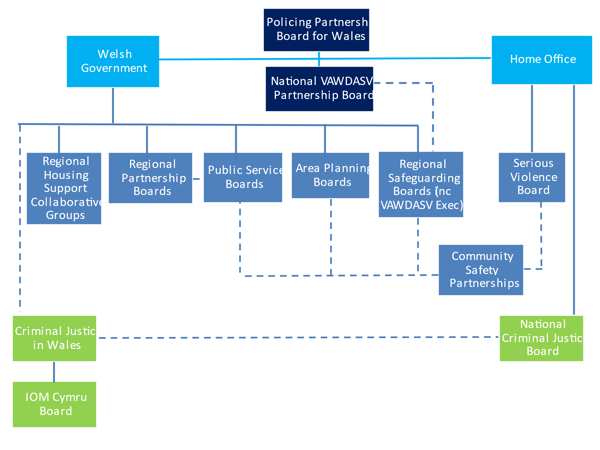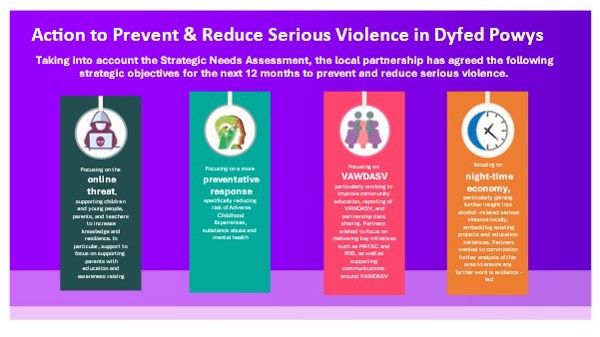Partners
The Police Reform and Social Responsibility Act 2011 states: “Commissioners have a duty to work with partners to prevent and tackle crime”
The key partnership duties include:
- Community safety duty; a reciprocal duty to work together to reduce crime and disorder, antisocial behaviour, re-offending and substance misuse
- Criminal justice duty; to provide an efficient and effective Criminal Justice System for the police area
- Safeguarding; responsible for safeguarding children & young people and promoting their welfare
The below structure gives a high level overview of some of the key partnership structures in place across Dyfed Powys and nationally:

Public Service Boards
PSBs were formally established under the Wellbeing of Future Generations Act 2015 with the objective to improve the economic, social, environmental & cultural well-being of the area. The Police and Crime Commissioner and Chief Constable are statutory invitees to the Boards and work closely with partners across Dyfed Powys on this agenda.
The links below will take you to the websites for each area’s PSB:
- The Carmarthenshire We Want
- Public Services Board - Pembrokeshire County Council
- Ceredigion Public Services Board - Ceredigion County Council
- Well-being in Powys - Powys County Council
The Commissioner works closely with PSB colleagues to deliver on some vital areas of work including the introduction of the Real Living Wage to organisations across Dyfed Powys and the prevalence and impact of violence that is felt by our communities. Partner agencies will be heavily involved in the planning and delivery of interventions to prevent violence as part of the collaborative work under the Serious Violence Duty.

Area Planning Boards
Area Planning Boards were introduced to provide accountability and scrutiny of substance misuse planning, performance and financial management sitting under the responsible authorities of the Crime and Disorder Act 1998. Area Planning Boards also align to the Future Generations Act.
The PCC works closely with partners to jointly commission prevention and treatment services, reducing the harm caused to individuals and communities by substance misuse.
The Commissioner has worked with Area Planning Board colleagues to reduce the harm caused by substance misuse, in particular ensuring that over 800 Dyfed Powys Police staff are now trained to carry Naloxone, which can reverse the effects of an opioid overdose, providing vital time for individuals to reach and receive treatment and intervention.
Other good practice includes the Blue Light Project, which uses specially trained nurses to engage with frequent callers to emergency services due to their substance use. The project has secured long term funding and aims to reduce the burden on police and ambulance as well as other NHS services.
Substance misuse services in Powys have been some of the first to implement the ACE Hub Wales Trauma and ACE (TrACE)-Informed Toolkit, ensuring that services are fully trauma informed and can identify and respond appropriately to those with adverse childhood experiences. This includes the design of service centres against a specific model that supports and assists with recovery.
